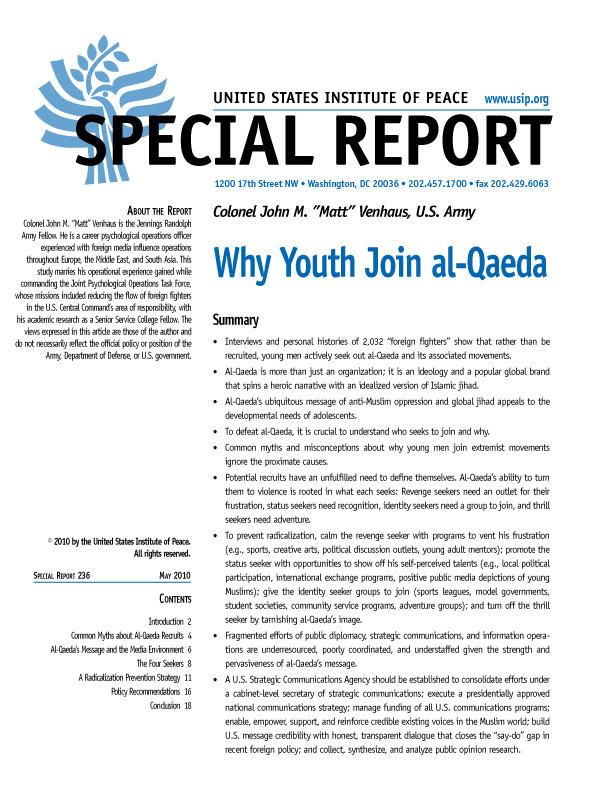Why Youth Join al-Qaeda
Interviews and personal histories of 2,032 "foreign fighters" show that rather than be recruited, young men actively seek out al-Qaeda and its associated movements. Al-Qaeda is more than just an organization; it is an ideology and a popular global brand that spins a heroic narrative with an idealized version of Islamic jihad.

Summary
- Interviews and personal histories of 2,032 "foreign fighters" show that rather than be recruited, young men actively seek out al-Qaeda and its associated movements.
- Al-Qaeda is more than just an organization; it is an ideology and a popular global brand that spins a heroic narrative with an idealized version of Islamic jihad.
- Al-Qaeda’s ubiquitous message of anti-Muslim oppression and global jihad appeals to the developmental needs of adolescents.
- To defeat al-Qaeda, it is crucial to understand who seeks to join and why.
- Common myths and misconceptions about why young men join extremist movements ignore the proximate causes.
- Potential recruits have an unfulfilled need to define themselves. Al-Qaeda’s ability to turn them to violence is rooted in what each seeks: Revenge seekers need an outlet for their frustration, status seekers need recognition, identity seekers need a group to join, and thrill seekers need adventure.
- To prevent radicalization, calm the revenge seeker with programs to vent his frustration (e.g., sports, creative arts, political discussion outlets, young adult mentors); promote the status seeker with opportunities to show off his self-perceived talents (e.g., local political participation, international exchange programs, positive public media depictions of young Muslims); give the identity seeker groups to join (sports leagues, model governments, student societies, community service programs, adventure groups); and turn off the thrill seeker by tarnishing al-Qaeda’s image.
- Fragmented efforts of public diplomacy, strategic communications, and information operations are underresourced, poorly coordinated, and understaffed given the strength and pervasiveness of al-Qaeda’s message.
- A U.S. Strategic Communications Agency should be established to consolidate efforts under a cabinet-level secretary of strategic communications; execute a presidentially approved national communications strategy; manage funding of all U.S. communications programs; enable, empower, support, and reinforce credible existing voices in the Muslim world; build U.S. message credibility with honest, transparent dialogue that closes the “say-do” gap in recent foreign policy; and collect, synthesize, and analyze public opinion research.
About the Report
Colonel John M. "Matt" Venhaus is the Jennings Randolph Army Fellow. He is a career psychological operations officer experienced with foreign media influence operations throughout Europe, the Middle East, and South Asia. This study marries his operational experience gained while commanding the Joint Psychological Operations Task Force, whose missions included reducing the flow of foreign fighters in the U.S. Central Command’s area of responsibility, with his academic research as a Senior Service College Fellow. The views expressed in this article are those of the author and do not necessarily reflect the official policy or position of the Army, Department of Defense, or U.S. government.



